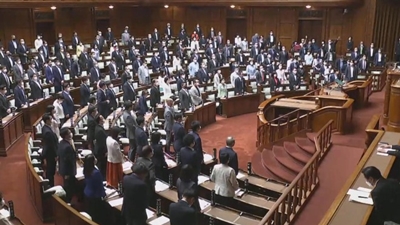
懲役刑と禁錮刑を一元化して「拘禁刑」を新設する改正刑法が参議院本会議で可決・成立しました。
➣A plenary session of the House of the Councilors has passed a revision to the penal code (刑法)to integrate two categories of confinement--“choeki” and “kinko”--into one called “kokin.”
※confinement=監禁 ➾imprisonment
懲役と禁固の違いは、刑務作業があるかないかです。
➣Choeki, which means imprisonment with prison labor. Choeki obliges prisoners to carry out designated work. Kinko, in comparison, means imprisonment without labor.
2020年、16000人余りの囚人のうち禁錮刑は約50人ですが、大半は自ら望んで作業をしました。
➣Among newly imprisoned inmates in 2020, only 0.3% were not sentenced to imprisonment with labor. Of those who were sentenced to imprisonment without work, about 80% engaged in such labor of their own volition.
※inmate=囚人、(病院・刑務所などの)収容者 in中の+mate仲間
➾convict/ the convicted有罪になった人
※volition 〔意思の力による〕選択、決定、決断=will
of/out of one's own volition=自主的に、自ら進んで[選んで]
刑法成立から115年。懲役と禁固の差があいまいになってきています。
➣Now, 115 years after the enactment of the Penal Code, the line between imprisonment with and without labor has become blurred.
※blur=ぼやけさせる、かすませる、(区別などを)曖昧にする
➣There is seen to be less need to differentiate between “with labor” and “without labor,” and a greater need to focus on correction and prevention of recidivism.
※differentiate=〔~を〕識別[区別]する、差別化する、〔~に〕違いをつける
◇高齢化で、体力的にも認知機能上も、作業が困難な囚人も増えています。
➣Inmates in Japanese prisons are graying, with 2,143 of them aged 65 or older in the year 2020, or 140% more than the number in 2000. Some are having difficulty engaging in normal prison work due to reduced physical strength and cognitive function.
※cognitive function 認知機能
◇そして近年、再犯率は増加しています。
➣The worsening recidivism rates were also a major factor for the revision. Of those detained by police for criminal offenses in 2020, the recidivism rate reached a record high of 49.1%.
※recidivism rate再犯率、累犯率 recidivism悪事を繰り返すこと、犯罪を重ねること、累犯、常習的な悪行
動詞=recidivate ラテン語で元の状態に戻る、再び転落する recidivist常習犯人(の)
改定目的は、犯罪者の懲罰ではなく更生に力を入れることです。
➣The change is aimed at promoting the rehabilitation of criminals by providing programs better suited to the needs and characteristics of individual prisoners.
見出し:Possible revision to Japan's Penal Code to emphasize rehabilitation over retribution
※rehabilitation傷病者の機能回復訓練、職業訓練および社会的支援活動、犯罪者などの更生➾矯正correction
※retribution (特に悪業などに対する相当の)報い、仕返し、報復
➣Punishments under the current Penal Code are aimed at preventing recidivism and, in essence, have long been interpreted as a form of retribution. But in recent years, the concept of rehabilitation has begun to win ground over punishment.


